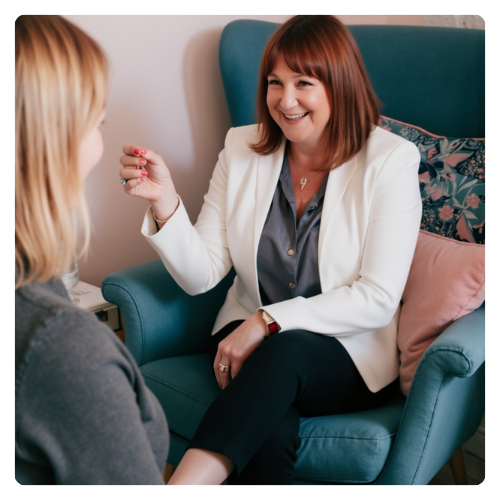Welcome to the Aphantasia Academy
Home of the UK’s leading specialised training for cognitive differences like aphantasia. Offering unique and pioneering programmes you won’t find anywhere else.
Discover pioneering training that helps therapists and coaches understand and adapt to invisible cognitive differences such as aphantasia, SDAM, and anendophasia. As the UK’s leading training provider in this field, we equip you with the insight and skills to transform how you work with clients, open new possibilities in therapy, and stand at the forefront of inclusive practice.
Find out MoreWhat we do.
Specialist Training for Therapists
The Aphantasia Academy is the UK’s leading provider of training for therapists who want to become Aphantasia Therapists. Our CPD-accredited programmes equip you to recognise and adapt to cognitive differences such as aphantasia, SDAM, anauralia, anendophasia and alexithymia. You’ll learn how to support clients who can't visualise, recall memories in the usual way, or access an inner voice, ensuring your practice is inclusive, effective, and ahead of the curve. If you’ve ever searched for “aphantasia therapist training” or wondered how to work with clients who don’t respond to traditional techniques, this is the training designed for you.
Coaching for Individuals with Aphantasia
We also offer one-to-one coaching for people with aphantasia, supporting you to thrive in life, work, and relationships. Our coaching is designed to empower you with practical strategies and tools that work with, not against, your cognitive style.
Training for Educational and Mental Health Professionals
We provide workshops, seminars and tailored training programmes for universities, colleges, counselling teams and student support services. These sessions raise awareness of aphantasia, SDAM, anauralia, anendophasia and alexithymia, helping staff to better understand and support students and clients.
Workplace Wellbeing Programmes
For selected organisations, we deliver customised workshops on cognitive differences as part of workplace wellbeing and inclusion strategies.

Aphantasia Therapist Training
Our specialised training programme designed for counsellors, therapists, and mental health professionals.

One-to-One Coaching
Coaching for people with aphantasia and cognitive differences like SDAM and anendophasia.

Corporate Services
Workshops, seminars and tailored training programmes to support understanding and inclusivity.
Aphantasia Coach Training
COMING SOON - Our specialised training programme designed for coaches. Join our mailing list to be the first to know when this is available
Understanding Cognitive Differences
Aphantasia – The inability to create mental imagery. Clients cannot ‘see’ pictures in their mind and often find visualisation techniques inaccessible.
SDAM (Severely Deficient Autobiographical Memory) – A difficulty recalling personal life events. Memories are facts, not vivid experiences, which can limit memory-based therapies.
Anauralia – The absence of an inner voice. Clients cannot ‘hear’ words in their head, making dialogue-based strategies harder to apply.
Anendophasia – The inability to generate thoughts in sentence form. This impacts approaches that rely on internal thought processes, such as CBT.
Alexithymia – A difficulty identifying and expressing emotions, often overlapping with aphantasia and affecting emotional processing in therapy.
Why It Matters
These differences are often invisible, but they shape how clients experience therapy. Without awareness, therapists may mistake them for resistance or disengagement. Our training ensures you can recognise these differences and adapt your practice with confidence.
Receive our Newsletter"I found this training incredibly educational and intend to use it to be more mindful of these hidden differences when interacting with clients, friends and family. I also found it to be personally validating as I suspect that I have a degree of SDAM and alexithymia which has led to me feeling defective during previous, private counselling sessions when I struggled to recall life events or connect to feelings." Jill





